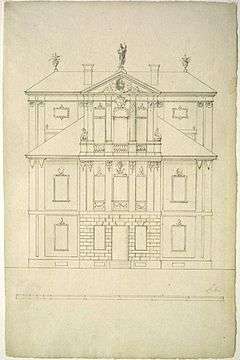Kotowski Palace
| Kotowski Palace | |
|---|---|
 Kotowski Palace, design by Tylman van Gameren. | |
| General information | |
| Architectural style | Baroque |
| Town or city | Warsaw |
| Country | Poland |
| Construction started | 1682 |
| Completed | 1684 |
| Demolished | 1944 |
| Client | Adam Kotowski |
| Design and construction | |
| Architect | Tylman Gamerski |
Kotowski Palace (Polish: Pałac Kotowskich) was a 17th-century palace in Warsaw, Poland. It served as a main cloister building for Benedictine Sisters of Perpetual Adoration.
History
The palace was built some time between 1682 and 1684 for Adam Kotowski, the royal cup-bearer at King Jan Sobieski's court, and his wife Małgorzata Durant. This large, three-storied Baroque building in Palladian style was designed by Tylman van Gameren. In 1688 it was purchased by Queen Maria Kazimiera and transferred to the Benedictines of the Blessed Sacrament. From 1688 till 1692 the Kotowski residence was transformed into a church-cum-cloister by Tylman van Gameren.[1] In the 18th century the monastery was enlarged. Around 1745 the new palace was built at the New Town Market Square and from 1771 till 1779 King Stanisław August Poniatowski established a new building situated at the escarpment. Those two buildings were connected in 1788.
During the Second World War, the building was used as a hospital. This made it a frequent target for bombing by the Germans in the Warsaw Uprising.[2] The palace was completely destroyed by them afterwards and was never reconstructed.[3]
See also
References
- ↑ Stefan Kieniewicz, ed. (1984). Warszawa w latach 1526-1795 (Warsaw in 1526-1795) (vol. II) (in Polish). Warsaw. ISBN 83-01-03323-1.
- ↑ "Historia kościoła św. Kazimierza". www.sakramentki.opoka.org.pl (in Polish). Retrieved 9 July 2008.
- ↑ "Zespół kościelno-klasztorny Sakramentek na Rynku Nowego Miasta". www.varsovia.pl (in Polish). Retrieved 9 July 2008.
Further reading
- Warszawa w latach 1526-1795 t. II, red. Stefan Kieniewicz, Warszawa, 1984. ISBN 83-01-03323-1
Image gallery
-

Kotowski Palace, interior design
-

Cloister on painting by Bernerdo Belotto
External links
Coordinates: 52°15′12″N 21°00′33″E / 52.25333°N 21.00917°E